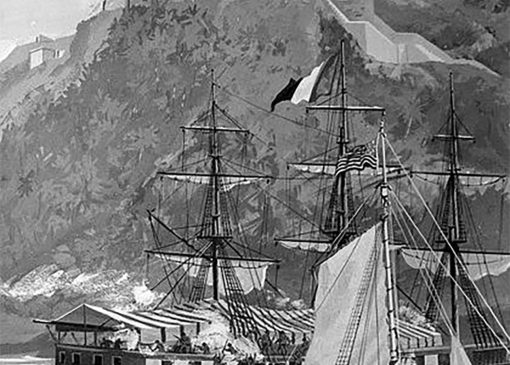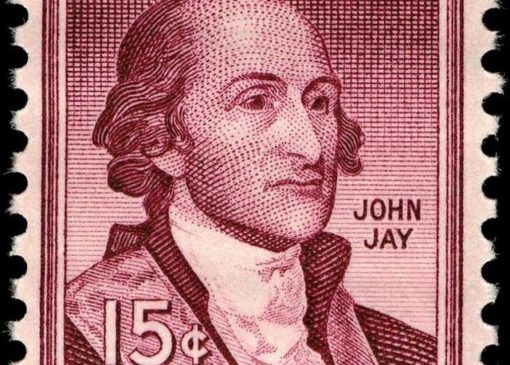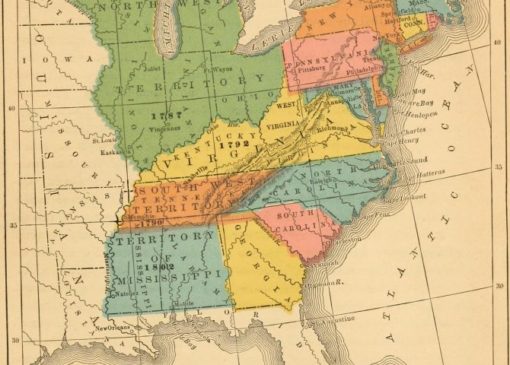*Editor’s Note: Chronicles of an American Diplomat: John Quincy Adams is a series following John Quincy Adams from his education at his father’s side through the American Founding Period, through to his own official embarkment on a diplomatic career, and the events that transpired during the era that he had to navigate. We know much of John Quincy Adams, and his times, from his massive writings, which collectively constitute an American Classic. This offers a chronicle of the opening of his public career from 1794-1801. The following is the ninth post in the series.
~*~*~*~
In Dispatch #8, (October 29-November 6, 1794) John Quincy sailed for Helvoetsluys, the Dutch port most convenient to the Hague. Getting from the packet to the coast, and eventually to the Hague, was its own adventure, however. The process of receiving diplomatic recognition in Europe, even in the best of circumstances, was often complex and convoluted. Each country had its own traditions and procedures. Moreover, the Netherlands were engulfed in war. A novice envoy could easily commit an offensive indiscretion, delaying proceedings. John Quincy was determined to tread carefully.
~*~*~*~
November 7, 1794. While waiting for the decision by the States General on his status, John Quincy received a letter from the Amsterdam Bankers. It was bad news: They had done nothing on the loan of 800,000 dollars, lacking the notice of commission that David Humphreys, the American minister in Lisbon, was supposed to send them. The Bankers added that under the present circumstances, the loan would be altogether impracticable, and they could not foresee the time when it might again be feasible. John Quincy sent this information to the US Secretary of State, assuming that he and Treasury Secretary Alexander Hamilton had already been made aware of this.
To Secretary Randolph, he then went into great detail on the situation in the Netherlands and the war in general, elaborating on his earlier correspondence. All signs still pointed to a general peace on the continent between France and the Combined Powers, leaving the French and British the only contenders. The reported peace agreement with Prussia was only the beginning; the remaining powers would soon follow suit. Reflecting their newfound domestic moderation, the French would most likely offer moderate terms to all but Britain, because of extreme animosity against that power.
The British, on the other hand, and their imperious generals, were widely despised as allies. “They have made themselves equally obnoxious to all parties, and plunder and illtreat the Stadtholderians as much as the Patriots. . . . The violence and misconduct of the British troops is a fact established beyond a question[.]” Their armies seemed to lack in spirit and had a propensity to retreat.
Would the Dutch join the rush to settle with France? Self-preservation on the part of the ruling Orangists clearly pointed in that direction, especially now that Prussia, which had considerable influence because of family royal ties, was apparently out of the war. Although Patriot opinion was not unified, John Quincy had not changed his opinion that “numbers here would rather see the conquest of their country completed by the French, than a peace made by them with the government now established here.”
American developments were also part of the fluid transatlantic situation. “I hope we shall soon have some agreeable intelligence from our own country. The western insurrection [Whiskey Rebellion] has a most disagreeable effect upon the credit and reputation of America. A thousand exaggerations of the fact are propagated with great avidity, our friends know not what to deny, the malevolence of our enemies is gratified, and the advocates of universal freedom and humanity are afraid of losing the only country for which they can appeal for the practicability of their theories. I hope we shall soon relieve them from their alarms, and shew them once more the perfect image of united liberty and submission.”
November 8, 1794. John Quincy took a walk in the woods. Van Hees called and informed John Quincy that their High Mightiness’s had passed a resolution, “the purport of which he repeated, but so rapidly and in so low a voice that I could not particularly understand it.” Van Hees said the Resolution was not yet reduced to writing, but as soon as it should be, he would send it to John Quincy. “The amount of it is to acknowledge me in the character conferred on me by the President [Washington], and the proceeding is no doubt according to the usual forms.”
John Quincy asked whether there was any intelligence from the armies. Van Hees said that according to the last accounts, Nimeguen was heavily bombarded. The news from Maestricht was very bad. “It is pretended,” said he, “that it capitulated on the 4th.” John Quincy told him the campaign probably must terminate soon. “It must come to an end soon somehow or other,” Van Hees responded. John Quincy asked if the King of Prussia had made peace. “So it is said, but the letters from Berlin deny it.” What did that mean? “The latest letters from thence. Generally, the letters from Berlin.” John Quincy drew the inference that the reports of Franco-Prussian peace were not absolutely conclusive.
November 9, 1794. John Quincy again walked in the woods, went to a book sale, did some reading, and wrote a letter to his father. He covered much of the same material as he did for the secretary of state, but in a more personal tone, especially since John Adams had spent considerable time in the Netherlands.
Upon arrival, he recounted, he had been struck by how quiet things were. Too quiet; it was as if the people had no interest in the fate of their country. “You remember, Sir, how feeble the efforts of this people were when their war broke out with England in 1781. Yet at that time the active spirit of liberty predominated. Patriotism was the popular idol, and the power which upon the whole governed the country rested much for its support upon the motives of public spirit.
But now that the reins of government are held by a power, professedly founded upon mere force, a power which has always been at war with public spirit and considered patriotism as its deadly enemy, which has always dreaded enthusiasm and discountenanced the amour sacré de la patrie, you may judge what a state of lifeless imbecility characterizes the people, even at a moment so full of danger and dismay as the present. . . . This people I fear have lost that energy of character which once so honourably distinguished them. . . . It is to me a new thing under the sun, to see a people anxious to be conquered and anxious for the success of their enemies; though not indeed in the spirit of Christian humility.
The Dutch seemed no longer to have “the warm, animated zeal, which is necessary for the defence of an invaded country, the dauntless heart and the nervous arm, which inspired and directed by the enthusiasm of liberty have heretofore performed miracles for the salvation of this as well as of other countries, are another.” They were contending with an enemy “of a very different description, with armies powerful in numbers, under the most perfect discipline, of uncontrolable impetuosity, and who pursue to the utmost every advantage they obtain.” On the Dutch side, John Quincy wrote, it had been so long since that country had been invaded by land that it no longer had experienced officers, especially those in command of fortified towns. Promotion was based on patronage, not qualification.
John Quincy added:
In my official correspondence with the Secretary of State, I feel a restraint, owing perhaps to the natural awkwardness of novelty. The constant dread of committing some impropriety, prevents me from saying many things. If any facts or observations contained in my letters to you are in your opinion worthy of being known to the President, I have no doubt you will impart them to the Secretary of State. I have all possible confidence in him personally, and hope to acquire in time of the habit of writing to him with as much freedom as is consistent with diplomatic decorum.
In fact, as the months went on, John Adams would forward his son John Quincy’s personal correspondence directly to President Washington, who found them particularly insightful.
November 10, 1794. John Quincy attended a book sale and purchased a few copies. Van Hees sent the resolution of their High Mightinesses relative to John Quincy’s reception, which included an invitation for an audience, either in the Assembly of the States or by Commissioners to be appointed for that purpose. John Quincy forwarded a copy and translation to the Secretary of State.
November 11, 1794. John Quincy called on Van Hees to inquire which of these alternatives for an audience had been chosen by his predecessor, William Short. Van Hees assured him that they were both mere formalities which were always dispensed with, except on particular and extraordinary occasions, and had been so in the case of Short. John Quincy’s reception and official acknowledgment were now complete. If he had any communication to make for the future, the person with whom he was to maintain official correspondence would be the Greffier, and if he should have memorials to present, they were to be delivered to the weekly President.
John Quincy apologized to Randolph if “this minute detail of forms,” which he had accumulated in a lengthy dispatch, “appear tedious and perhaps trivial. But in these countries they are so much in the habit of annexing importance to accuracy in these particulars, and I have felt so much the want of information as to the mode of proceeding in this respect, that I thought it might at least save trouble upon some future occasion to have the regular process of reception transmitted to the Department over which you preside.”
He went to the book sale again, and took a lengthy walk, this time nearly to Scheveningen.
November 12, 1794. John Quincy was on a book purchasing spree of sorts, recording another such purchase. Per protocol, John Quincy called on various Dutch ministers, including the Grand Pensionary of Holland. He also composed a lengthy letter to his mother, echoing earlier correspondence with American officials, but adding his reflections on events in France.
He was struck by the number and character of the emigres, both in England and the Netherlands. Their poverty, he felt, must excite compassion. He found that the shock of the transition “from the most immense fortunes to the most abject indigence,” was handled much better by the women — something that would not surprise Abigail. By their industry they managed to keep their families fed, while their partners “saunter about the streets, and idle away their present existence as they did that of their prosperity, incapable of exertion, and exhibiting the melancholy prospect, of objects, whom not even calamity itself can entitle to respect.”
What would become of these miserable beings? The French military had exempted them from any terms of surrender and those found bearing arms had been shot without mercy. “They are obliged to fly from one place of refuge to another, and are hunted down like wild beasts.”
And what had they fled? Details about “the most inconceivable cruelty” of the Terror were being exposed in the National Convention: “The most unrelenting thirst for blood ever indulged by priestly bigotry, the most abominable massacres of religion that ever desolated the earth furnish nothing to exceed the infamies committed in Brittany, La Vendee, and Lyons by the satellites of Robespierre.” The French public had been shocked by the revelations and such effusions of blood were now deemed unfashionable. But he feared that was hardly the end of the story.
For the popular Societies and the system of terror are still formidable, and if the fashion of humanity should pass as rapidly as all the other political fashions which have alternately had a momentary prevalence, for the last five years, terror will again become the order of the day; new inventions for expediting the wholesale trade of murder will be multiplied, Modesty will again be obliged to hide her head, and Benevolence to weep in secret at the celebration of Republican nuptials, and the furies of destruction will again be loosened to feast on human blood.
John Quincy devoutly hoped his countrymen would heed the warning and “destroy the influence of those self-constituted Legislators, that have arisen among us in imitation of the popular Societies in France.”
What were the prospects for Europe as a whole? “The progress of opinions adverse to the system of hereditary privileges is continually advancing, and the Nations of this Hemisphere, are growing more and more dissatisfied, with the Governments to which they have hitherto submitted.” But there was no rational plan to substitute for the old order. “With heaviest sound, a Giant Statue falls, and what sort of fabric will be erected upon its ruins, it would require gifts more than prophetic to conjecture.”
November 13, 1794. Before leaving Boston, Abigail had warned her sons not to drag some European lady home with them when they returned. John Quincy wrote to reassure her: “We do not find here as yet any of the nymphs of the Country, whose attractions are like to steal our hearts.” He did acknowledge that “we have seen however in the streets some very beautiful women, whom we have understood to be refugees from France.”
One woman did attract his attention. When he was living in the Netherlands as a teenager, he became acquainted with Anna (Nancy) Jacoba Dumas, the daughter of his tutor, C.W.F Dumas. They may then have felt romantic stirrings. At the very least, he had become friendly with this bright and engaging young woman (she exchanged poetry with John Paul Jones). Nothing romantic was possible now, however, when he paid her a visit — she was Madame Veerman, married with three children. “I shall see her to avoid the appearance of singularity or affectation. I shall see her, I doubt not, with composure; perhaps with indifference, but not with pleasure.”
~*~*~*~
A Note About the Construction: In attempting to provide chronicles of John Quincy’s early diplomatic career, we utilize his daily diary (journal) entries as the foundation, but group these and other material so as to provide a coherent narrative, while still retaining an “as it happened” framework. For instance, he often reflects on events, and the contents of letters and documents, days after they occurred or were received. We provide footnotes to give the reader an accurate account of the sources and their dates.
Primary Sources
APM — Adams Family Papers, Microfilm Edition, Massachusetts Historical Society, with Reel Number. The indicated transcripts were prepared from this source.
DJQA — Diary, from the Memoirs of John Quincy Adams, comprising portions of his diary from 1795 to 1848, edited by Charles Francis Adams, volume 1.
DJQA (original manuscript). Material not included in the Charles Francis Adams printed version. The indicated transcripts were prepared from this source.
FOL — Founders Online, National Archives https://founders.archives.gov
LD/SE — Line-a-day and short entries from his diary, APM, and available online through the Massachusetts Historical Society. http://www.masshist.org/jqadiaries/php/ The indicated transcripts were prepared from this source.
WJQA — Writings of John Quincy Adams, edited by Worthington C. Ford.




